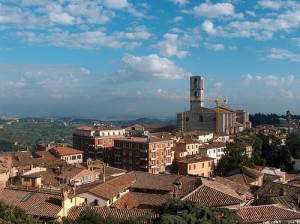Archive for the ‘uniquely italian’ Category
The Media Circus in the Amanda Knox Case
 On Monday I talked about the alleged anti-Americanism in the Amanda Knox case from my perspective as an American living in Italy. The comments got a bit (a lot) out of control with a debate about whodunit, what the police did right/wrong, and all kinds of stuff that weren’t mentioned in my post.
On Monday I talked about the alleged anti-Americanism in the Amanda Knox case from my perspective as an American living in Italy. The comments got a bit (a lot) out of control with a debate about whodunit, what the police did right/wrong, and all kinds of stuff that weren’t mentioned in my post.
That’s cool — I don’t want to stifle discussion, even though I’m sure many of the posters have been all over the Internet saying the same things. I’d rather comments stick more to what the post is about though, and I will be moderating more tightly on this post and on Friday’s (and the comments are also going to moderation first, so please be patient); I may also close the comments on Monday’s post, so if you have your last words, get them in now!
On the other hand, I very much appreciated reading thoughtful comments from those of you who addressed whether you felt anti-Americanism had anything to do with the Amanda Knox case — especially from those of you who have lived or currently live in Italy. I’d especially like to direct your attention to a comment posted by my friend Tina who is from Seattle but was living in Perugia at the time of the Kercher murder; I think this is a perspective hardly ever mentioned in any press.
Today I’m talking about another of my pet peeves in this case: the so-called media circus surrounding the trial. In the grand scheme of this awful case about the brutal murder of a young woman, this is absolutely a minor point in the discussion; I don’t deny that. Nonetheless, it’s something that bothers me every single time I see it mentioned in the American press, so I want to talk about it here in my personal space.
The So-Called Media Circus
 The American media loves to put out the idea that Italy has made the image of Amanda Knox equivalent to that of a cold, heartless, sex-crazed killer and that Italians are salivating over every detail of this case as it happens, talking about it over their morning espresso, wondering how Knox will wear her hair tomorrow. Please.
The American media loves to put out the idea that Italy has made the image of Amanda Knox equivalent to that of a cold, heartless, sex-crazed killer and that Italians are salivating over every detail of this case as it happens, talking about it over their morning espresso, wondering how Knox will wear her hair tomorrow. Please.
Just. Not. True.
Regarding the alleged attacks on Knox’s character: sorry, but Italy is being confused with English/British tabloids on this one. And, by the way, regarding the tabloids, I’m in complete agreement with those who are disgusted with some of their coverage on this case. For me, the Foxy Knoxy crap — along with the “Rudy Guede, drug-dealing drifter” stuff — was vile, and continues to be.
Now to be fair, Italian and American news organizations also published sensationalistic headlines, albeit more about Guede than about Knox in the case of American ones. But I’m not talking about *what* was published. I’m talking about how much people cared in Italy, or the so-called media circus regarding the case.
Or put another way, “If a tree falls in the forest and no one is around to hear it, does it make a sound?”
 The simple truth is that this case wasn’t and isn’t a big media deal in Italy outside of Perugia; several of my friends throughout Italy have confirmed that this has been their experience in their far-off corners of the Bel Paese as well. There are, were, and will be national news stories when important trial events come up, but by no means is this a story that has gripped a nation.
The simple truth is that this case wasn’t and isn’t a big media deal in Italy outside of Perugia; several of my friends throughout Italy have confirmed that this has been their experience in their far-off corners of the Bel Paese as well. There are, were, and will be national news stories when important trial events come up, but by no means is this a story that has gripped a nation.
I’m not saying the lack of interest is a good or bad thing. I’m only discussing it here to give those outside of Italy an accurate sense of what the climate has been like here regarding this case: there hasn’t been much of one.
To put it in perspective, as someone who comes from the country of O.J. Simpson’s Trial of the Century, I can honestly say this case never came close to that level of interest outside of Perugia. There simply has been no media circus unless you go looking for it on the Internet, in which case, well, you can find anything on the Internet, can’t you?
Part of the reason this misconception bothers me so much is the discussion of the sex angle, which my fellow American expat bloggers in Italy Michelle and NYC/Caribbean ragazza mentioned in their comments to Monday’s post; American “journalists” want to make it seem like Italians were so aghast by any mentions of sex in this case that they were ready to convict Sollecito, Guede, and especially Knox because of it.
The real Italy we live in, though, just isn’t as puritanical as the United States on such things. On Monday Michelle wrote, and I wholeheartedly agree:
Another angle that is much discussed in the U.S. media which isn’t such a big deal here is the whole “wild sex” aspect. The U.S. media makes it seem like the Italians (who are all ostensibly devout Catholics and reserved about their sexuality) have persecuted Amanda because she was a “free-spirited American woman involved in some kind of kinky sex game.” I don’t think Italians really care about the sex aspect. Anyone over in the U.S. who thinks that is the case need only come over here and turn on the TV. What they will see is that Italians flaunt sexuality in yogurt ads and that topless women in g-strings dance on evening programs meant for the whole family. Italy may be home to the Vatican, but Italians have fewer sexual hang-ups (IMO) than Americans do.
So, please, American “journalists,” stop calling this Italy’s trial of the century and painting a picture of this country that just isn’t true. Exaggerations may help to build a better story, but this is yet another reason why you lose credibility with those of us who live here — and why those who don’t live here should be careful about believing everything you “report.”
Come back Friday when I’ll talk about the evidence outlined in the motivazioni della sentenza, the court’s opinion in the case; Americans who have been led to believe Knox was convicted based on her strange behavior may be surprised by what the judges and jury actually heard regarding physical evidence and eyewitness testimony.
Fellow Americans and foreigners in Italy as well as Italian natives, I’m especially interested in hearing your opinions and experiences, so please add your two beans! The same goes for everyone else too, of course. Please let’s try to remain civil and respectful. Personal attacks will not be tolerated.
[PHOTO CREDITS: All on Flickr via Creative Commons license: Circus by Thomas Totz; English tabloids by saschapohfleep on Flickr; Perugia: Università degli Stranieri by Francesco Gasparetti]
Anti-American Bias in the Amanda Knox Case: Perspective of an American Lawyer in Italy
 After writing my review of Murder in Italy by Candace Dempsey, I found I hadn’t scratched the surface of what I had to say about this case. Once I started writing, I ended up with way too much material for one post, so I’m spreading it out this week, which apparently will be Amanda Knox murder trial week here at Bleeding Espresso. Believe me, I’m not thrilled about it either, but I do want to get this perspective out there, so I ask that you please bear with me, and we’ll get back to Calabrian sunshine and cuisine next week.
After writing my review of Murder in Italy by Candace Dempsey, I found I hadn’t scratched the surface of what I had to say about this case. Once I started writing, I ended up with way too much material for one post, so I’m spreading it out this week, which apparently will be Amanda Knox murder trial week here at Bleeding Espresso. Believe me, I’m not thrilled about it either, but I do want to get this perspective out there, so I ask that you please bear with me, and we’ll get back to Calabrian sunshine and cuisine next week.
Over the past couple years, many people have asked about my opinions, and I understand why: I am American, I have lived in Italy for seven years, and I am a lawyer. I’ve refrained from offering my opinion publicly as I simply don’t know what really happened in that house in Perugia in November of 2007.
While I may come from a somewhat unique perspective, I don’t know any more than anyone else, and it’s not my job to decide whether Amanda Knox, Raffaele Sollecito, and/or Rudy Guede played parts in Meredith Kercher’s death. Courts have heard the cases and decided, and we’ll soon be going through a similar process again. If you want speculation on “whodunit,” you can find it all over the Internet. Have at it.
Putting aside the “Did they do it?” questions, from where I’m sitting, there have been certain aspects of the case that have bothered me from the beginning; that is why I’m writing now. It should be understood, but I’ll say it anyway: what follows is MY perspective based on MY experiences as an American (Italian dual citizen) lawyer living in Italy. Your mileage may vary.
To me, there have been three major misconceptions about the trial on the part of the American media: the so-called anti-American bias in the Italian criminal justice system, the so-called media circus surrounding the trial, and the so-called conviction based on nothing. I’ll deal with each in turn, starting with:
The So-Called Anti-American Bias in the Italian Criminal Justice System
Let me start by saying I am disgusted with the way the American media has treated the Italian criminal justice system; if someone wants to bash the system, I have no problem with that *if* the person knows what s/he is talking about. If you don’t know the basics of the system let alone its ins and outs, it’s not only uninformed but also beyond disrespectful to (literally) shout about it on television news programs and rile up the masses, who probably know even less than the “journalists.”
From my experience — and as many fellow Americans and other foreigners living in Italy might agree — Americans here are often offered some of the best treatment of any foreigners in many aspects of society. I can’t and won’t speak for all Americans in Italy, but I have seen absolutely no underlying bias working against us; in fact, I would say it’s often quite the opposite. I lived here through most of the George W. Bush years, and even at the height of his unpopularity in Italy, Americans as a group weren’t hated — and that’s saying something, I think.
I’m having a hard time understanding why if Americans tend to be treated extra-well in everyday transactions, it would turn to animosity, even a witch hunt according to some, in a situation as serious as a criminal investigation — although let’s remember that Knox’s accusatory finger pointed at Congan native but long-time Perugia resident Patrick Lumumba had him arrested before he was even asked about an alibi, so they seemed to believe wholeheartedly in that American back then.
 Put another way, I have no problem with the argument that the verdict was against the weight of the evidence (the judges and jury got it wrong) or with those who question the wisdom of putting Prosecutor Giuliano Mignini, who was going through his own prosecutorial misconduct trial (and was eventually convicted) in charge. Indeed, these are absolutely valid challanges. But implying or insisting that the entire Italian criminal justice system had it out for Knox *because* she is American is absurd.
Put another way, I have no problem with the argument that the verdict was against the weight of the evidence (the judges and jury got it wrong) or with those who question the wisdom of putting Prosecutor Giuliano Mignini, who was going through his own prosecutorial misconduct trial (and was eventually convicted) in charge. Indeed, these are absolutely valid challanges. But implying or insisting that the entire Italian criminal justice system had it out for Knox *because* she is American is absurd.
Aside from personal observations, my mind keeps coming back to one question I can’t sufficiently answer, and I feel myself wanting to quote Denzel Washington’s line from Philadelphia, “Explain it to me like I’m a 4-year-old.” My question is this: “What would be in it for Italy to railroad Amanda Knox?” Millions of euros in tourism revenue lost per year because disgruntled Americans won’t visit and, taken to the extreme, the possibility that the most heavily armed country in the world wouldn’t come to its defense in a time of need?
OK, so maybe Mignini wouldn’t think on that grand a scale, but wouldn’t *anyone* throughout the entire government? I find it much more plausible that the Italian powers-that-be would find a way to make this go away if they saw a reason to do so. Remember Prime Minister Silvio Berlusconi came back into office in early 2008, just before a new American President would be taking over; couldn’t it have been an opportunity to forge a relationship with a new White House buddy?
Granted, like most murder cases, this one isn’t technically a national matter, but let’s be honest: Italy has liked staying on America’s good side since World War II, and anyone who knows anything about Italy knows Berlusconi can do pretty much whatever he wants. If he wanted this to go away, it would.
So I’m left to wonder: if a young American college student (a sympathetic “victim” if there ever was one) has been falsely accused of murder, wouldn’t it actually be in the Italian government’s best interests to fix the thing? Make it go away? Play nicey-nice with one of the world’s so-called superpowers? Or, short of that, make damn sure she gets a fair trial?
To be clear: I’m not saying the Italian criminal justice system is flawless. I’m also not saying there may not have been other improper and/or unethical reasons Knox was pursued as a suspect; from my experiences and observations, I just don’t believe her American citizenship was one of them.
I also don’t believe the Italian government would sit on its collective hands and let an American girl get “railroaded” as so many have claimed. It just doesn’t make sense to me why they would do that. Aside from not wanting a miscarriage of justice on their hands (never looks good on a government), international scandals just don’t look very good either — and Italy is famous for the bella figura.
 So maybe you’re thinking, “But part of the bella figura is actually solving a high-profile crime!” Indeed, but remember the police did have Guede’s DNA all over the crime scene, so his conviction wasn’t going to be difficult to obtain (and he’s even technically a foreigner although he spent most of his life in Italy). And let’s not forget there is also an Italian who has been convicted — on less evidence than there was on Knox IMHO. Anti-Italian bias?
So maybe you’re thinking, “But part of the bella figura is actually solving a high-profile crime!” Indeed, but remember the police did have Guede’s DNA all over the crime scene, so his conviction wasn’t going to be difficult to obtain (and he’s even technically a foreigner although he spent most of his life in Italy). And let’s not forget there is also an Italian who has been convicted — on less evidence than there was on Knox IMHO. Anti-Italian bias?
Or one could say the bella figura aspect means that Italy wouldn’t want to make itself look bad by admitting it was wrong about Knox. Sure, that’s a possibility, but remember the police also made a huge scene of arresting Lumumba, but then had to release him two weeks later when his DNA didn’t show up at the scene and he had a solid alibi. Plus it seems it would be much more brutta to send someone to prison for murder and then get called on the international carpet, so to speak, by the U.S. Secretary of State or President on the issue — and they’d have to believe that would happen if it was a clear case of railroading, no?
Now, to be clear, none of this means I necessarily think Knox and Sollecito are guilty of the crimes they’ve been convicted of, but at the same time, I can’t easily explain away the fact that no one from a higher level of Italian government has stepped in at any point to question the arrests and convictions — this despite a highly publicized outrage campaign by Americans, including politicians, albeit not top-level. Secretary of State Clinton said just after the verdict that she’d be willing to talk to anyone with concerns about the case, but there’s been nothing else reported on that as far as I know. If anyone knows the status of Clinton’s review, please do share.
To me, all of the above suggests anti-American bias had nothing to do with this case and that there just may be something behind the conviction after all — such as the 400+ page document written by the court that explains its decision, which I’ll be discussing later in the week. Before we get there though, on Wednesday I’ll talk about another of my pet peeves about this case: the so-called media circus surrounding the trial. Hope you’ll be back for that.
Fellow Americans and foreigners in Italy as well as Italian natives, I’m especially interested in hearing your opinions and experiences, so please add your two beans! The same goes for everyone else too, of course. Please let’s try to remain civil and respectful. Personal attacks will not be tolerated.
[PHOTO CREDITS: Perugia Panorama by Renzo Ferrante on Flickr; Perugia by Chris Yunker on Flickr]
Murder in Italy by Candace Dempsey: Amanda Knox Trial
 One of the biggest and most tragic stories to emerge from Italy in the past few years is the murder of Meredith Kercher, a 21-year-old English woman studying in Perugia. Kercher died in a pool of her own blood after being stabbed in the neck. And those are about all the details of this case that everyone can agree about.
One of the biggest and most tragic stories to emerge from Italy in the past few years is the murder of Meredith Kercher, a 21-year-old English woman studying in Perugia. Kercher died in a pool of her own blood after being stabbed in the neck. And those are about all the details of this case that everyone can agree about.
What has captured the attention and intrigue of many outside of Italy is the fact that an American student and Kercher’s roommate, Amanda Knox, was convicted of playing a role in Kercher’s death. Knox is currently serving a 26-year prison sentence along with Raffaele Sollecito, her Pugliese friend (I just can’t call him her “boyfriend” as he’s often called; they had been seeing each other for about a week before the murder), and Rudy Guede, a native of the Ivory Coast who had been adopted into an Italian family at a young age. Sollecito is serving 25 years in prison and Guede 16. All have upcoming appeals.
*
Candace Dempsey‘s book Murder in Italy: The Shocking Slaying of a British Student, the Accused American Girl, and an International Scandal sets out to tell the real story beyond the “media frenzy,” according to the backcover blurb.
Full disclosure: I received a review copy of the book and have known Candace since before Kercher’s murder (Candace’s family comes from Calabria so that is how we initially “met” online). In fact, Candace and I exchanged several emails about the case throughout the investigation. Candace soon began writing about the case on her blog Italian Woman at the Table, and it’s no secret that Candace has been an *extremely* strong supporter of Knox from early on — and although I know Candace tried hard to be objective, that support continues in this book.
I’m sorry to say that Murder in Italy wouldn’t be my first choice to get a balanced account of the facts of this case, although to be fair, I’m not sure if one exists anywhere as there are strong emotions on all sides. In Murder in Italy, the choice of evidence discussed, the way it’s presented, phrasing, and word choice all paint Amanda as innocent and the Italian police and judicial system as idiots at best, intentionally framing innocent people at worst.
 That said, the book covers the main events of the case well, offers details in matters that haven’t been greatly publicized, and delves into the personal backgrounds of many of the major players. For anyone interested in this case, you can find a lot of background information and become familiar with one perspective of what happened. To be honest, I didn’t read anything in the book that I hadn’t heard before, but I had been following the case fairly closely as a legal geek.
That said, the book covers the main events of the case well, offers details in matters that haven’t been greatly publicized, and delves into the personal backgrounds of many of the major players. For anyone interested in this case, you can find a lot of background information and become familiar with one perspective of what happened. To be honest, I didn’t read anything in the book that I hadn’t heard before, but I had been following the case fairly closely as a legal geek.
Aside from that, though, some little things bothered me throughout the book — misspelled/misused Italian words, sweeping generalizations about Italians and their beliefs, inconsistencies in Knox’s and Sollecito’s statements that were never addressed let alone explained, repeated themes without proof behind them (Knox’s Italian is described as very basic and even poor, but I’ve heard her speak Italian, and it’s not) and various phrases in quotes that aren’t attributed to any sources. To put it mildly, the editing should have been much tighter, and I chalk that up to the publisher wanting to get this out as fast as possible.
But the final verdict: would I recommend this book? Yes, I would, largely because of its most promising quality that I haven’t touched upon yet: readability.
Murder in Italy reads like a novel with so many plot twists and turns and complex characters, you won’t want to put it down. In fact, I read this in a couple days, never losing interest even though I already knew the essentials of the story. Candace has said that she wanted to write about the story as a dream turned into a nightmare, and she accomplished that. She also did a great job of painting the scene in Perugia and giving readers a little peek into this unique corner of Italy where a new crop of young foreigners pass through all the time.
So if you’re interested in the Amanda Knox case and/or enjoy true crime books, give Murder in Italy a look, knowing that you’re in for an engaging although not impartial read.
*
If you’d like to hear Candace talk about her book, Perugia, and more, check out our latest Eye on Italy podcast in which we also discuss the possible death of Nutella and blue mozzarella.
*
Subscribe to my Book Reviews feed — book reviews ONLY, which aren’t published to the main feed — by visiting Feedburner.
Do Italians Eat Pasta Every Day?
 One question I get from many people is whether Italians eat pasta every day. Of course answering such a question would require an enormous generalization, so I’m going to give you the experience in my house, which consists of a Calabrian and an American with Italian, Lithuanian, and German blood.
One question I get from many people is whether Italians eat pasta every day. Of course answering such a question would require an enormous generalization, so I’m going to give you the experience in my house, which consists of a Calabrian and an American with Italian, Lithuanian, and German blood.
Do we eat pasta every day?
Pretty much, yes. Usually either lunch or dinner — but hardly ever both — contains some kind of pasta for us.
I’m sure for some of you the thought of eating pasta every day sounds boring, and you’re positive you’d get sick of it within a week or so. This actually did cross my mind as I considered moving here — would I just get sick of eating pasta? And if so, then what would I do?
Well, seven years in, and I’m still having some pasta on most days. Don’t get me wrong; there are days when I just don’t want pasta. So I don’t eat it, easy peasy.
 “Pasta” Does Not Equal Spaghetti and Meatballs
“Pasta” Does Not Equal Spaghetti and Meatballs
One important thing to remember is that Italians don’t eat pasta with “red sauce” and meatballs every day; in fact, the rumors you’ve heard about Italians not eating “spaghetti and meatballs” are true; if there are meatballs, they are often huge and served after the pasta course, so you’ll have one, *maybe* two at the most.
That “red sauce” is often a ragù, made with meat (often pork and for us, rabbit or chicken); in our house, that’s probably a once every two weeks kind of dish, often on a weekend.
Also? Italians don’t just eat spaghetti. As I’m sure you know, pasta comes in all shapes and sizes, and part of the fun is matching what kind of sauce or accompaniment best suits a certain kind of pasta, so there’s a lot more than spaghetti going on around here.
So what else are we eating with pasta? Well I have a list of recipes to give you some ideas, and you’ll see everything from tuna (with or without tomatoes) to broccoli (no tomatoes) to ricotta fresca to fresh tomatoes and basil to prawns. We eat pasta cold in a salad in the summer and hot in minestrone in the winter — and with legumes like peas, ceci, and lentils year round.
Pasta is very versatile, and as always, I do encourage you to experiment.
But Pasta Makes You Fat!
Another misconception regarding pasta is that some people believe that if they ate pasta every day, they’d be the size of a house. The answer to that is, well, it depends on how much pasta you eat and what you’re eating with it.
 Pasta and carbohydrates have gotten a bad rap in health circles, but you *do* need them in your diet — in moderation, just like everything else that helps your body function the way it should.
Pasta and carbohydrates have gotten a bad rap in health circles, but you *do* need them in your diet — in moderation, just like everything else that helps your body function the way it should.
Italians seem to know instinctively that 100-200 grams of pasta a day falls well within the recommended daily allowances of carbs. You just have to not load up on carbs the rest of the day in order to keep a good balance.
Other health issues like diabetes may cause concern with carbs, but if you’re an otherwise healthy person, eating a bit of pasta a day is one of the common features of the Mediterranean Diet, which we know can offer great health benefits — but know that is not a “diet” as the word has come to be understood. It is a way of life.
Yeah, I’m Still Not Buying that I Could Eat Pasta Every Day and Not Get Sick of It
If you still can’t imagine eating pasta every day, think of it this way: do you eat bread every day? Many people do, in one form or another. Well you can think of pasta as our bread. It accompanies other ingredients and isn’t really the “point” of the meal — although it’s still an important part to be sure (see the discussion of matching pasta with sauce above).
Note also that Italians will generally *not* eat bread and pasta together, so don’t be surprised if you’re in an Italian restaurant and they swipe any bread off the table just as the pasta is served.
But hey, we’re not all created the same, so it very well may be that you would get bored with an Italian diet and with eating pasta every day. So why not come over here and find out?
How often do you eat pasta?
Enrich Your Italian Vacation with Milano Summer School
Would you like to learn more about Italian history, culture, opera, or fashion while on vacation here in the Bel Paese?
Read on for more information from Alexandra of the Milano Summer School.
—————
 Milan is the beating economic heart of Italy, and home to a number of the country’s most prestigious study institutions – Bocconi University for economics, Domus Academy for design and architecture and Istituto Moda Burgo for one of the city’s most famous exports, fashion. And this summer, from June 14th to August 7th, these institutions are opening their doors to students and culture fans alike from all over the world.
Milan is the beating economic heart of Italy, and home to a number of the country’s most prestigious study institutions – Bocconi University for economics, Domus Academy for design and architecture and Istituto Moda Burgo for one of the city’s most famous exports, fashion. And this summer, from June 14th to August 7th, these institutions are opening their doors to students and culture fans alike from all over the world.
The event, co-ordinated by the newly founded Milano Summer School, is a world first. Whether you fancy lessons in opera at La Scala Theatre, or workshops on International Relations, there is a summer course to meet every need and most of the big institutions are getting involved.
 The courses generally last one or two weeks, and you can choose from a range of themes including Fashion, Design, Theatre, Music, Art, Italian Culture and Language, Artistry, Tourism, International Relations, Medicine and Surgery, and Italian for Foreigners.
The courses generally last one or two weeks, and you can choose from a range of themes including Fashion, Design, Theatre, Music, Art, Italian Culture and Language, Artistry, Tourism, International Relations, Medicine and Surgery, and Italian for Foreigners.
The course organisation will also help visitors to find accommodation in the city and will implement a programme of social events so that participants on the various courses can interact and feel part of a larger summer school community.
There are a number of useful links you can have a look at to find out more:
- Milano Summer School
- VisitMilano.it and Turismo.milano.it for tourist information about Milan
- The current issue of Néo News online magazine, which is dedicated to the Milano Summer School
If you’re looking for a novel way to visit Italy this summer and learn more about the rich culture of the Bel Paese, this might just be it!
—————
Thanks so much Alexandra!
If you have questions, please get in touch with Milano Summer School,
and in any event, have a great summer!
















